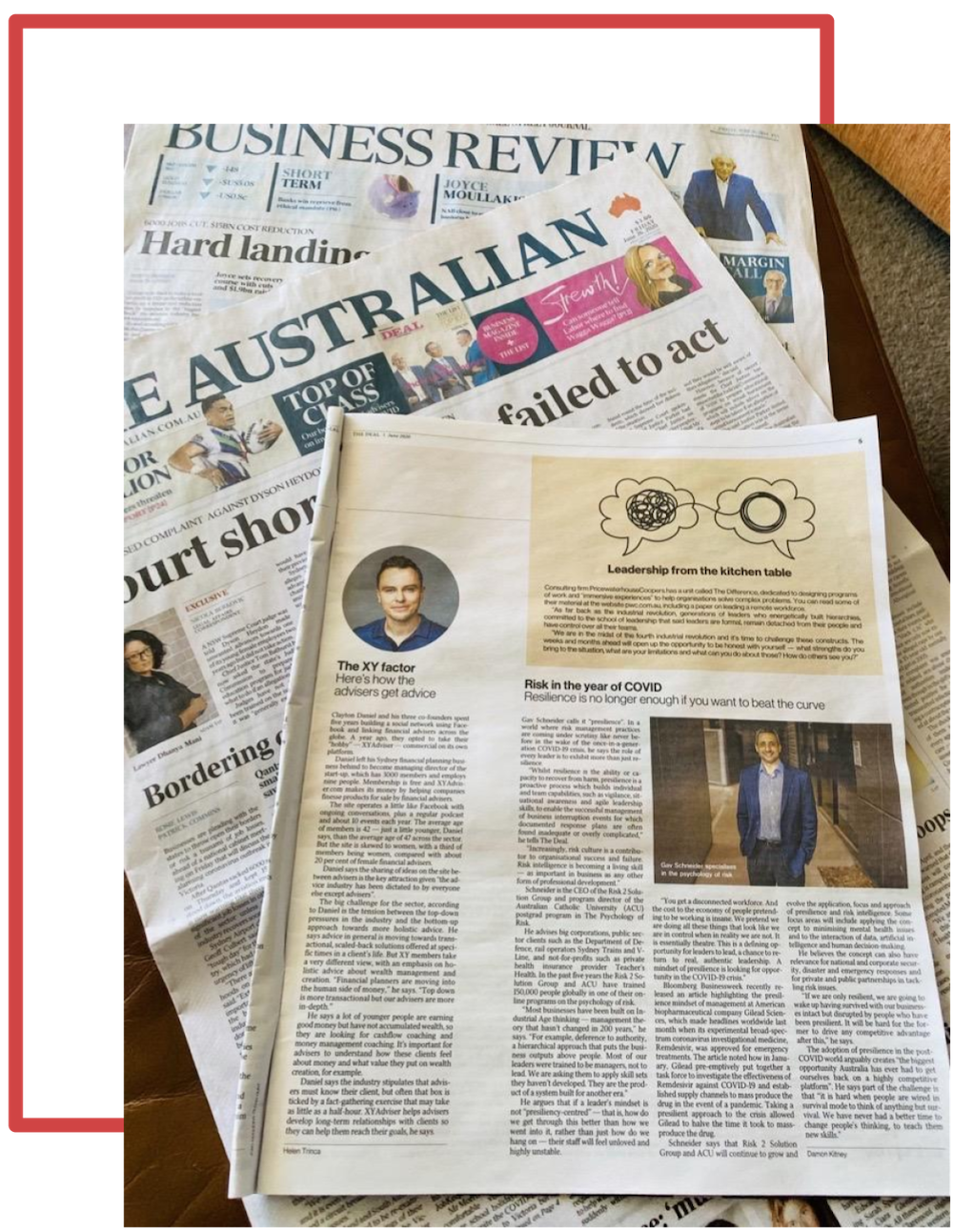VIDEO GALLERY
CEO of the R2S Group of Companies and creator of the Presilience concept, Dr Gavriel Schneider, explains the origin and meaning of the term. Dr Schneider goes into detail about the benefits adopting a Presilience approach has for individuals, teams and companies.
-

#1 Introduction to Presilience®
-

#2 The Maturity Journey from Compliance to Presilience®
-

#3 Key Differences Between Compliance, Resilience and Presilience®
-

#4 Why We Must Build Skills in Our People
-

#5 Developing and Empowering Sheepdogs in Your Organisation
-

#6 What We Need to Achieve from a Human Attribute Perspective
-

#7 Where Does Technology Feature in the Presilience Model
-

#8 The Key Aspect for Presilience Centric Positioning
-

#9 Audit, Assurance and Presilience
RISK IN THE YEAR OF COVID
Resilience is no longer enough if you want to beat the curve
Gav Schneider calls it “presilience”. In a world where risk management practices are coming under scrutiny like never before in the wake of the once-in-a-generation COVID-19 crisis, he says the role of every leader is to exhibit more than just resilience.
“Whilst resilience is the ability or capacity to recover from harm, presilience is a proactive process which builds individual team capabilities, such as vigilance, situational awareness and agile leadership skills, to enable the successful management of business interruption events for which documented response plans are often found inadequate or overly complicated,” he tells The Deal.
“Increasingly, risk culture is a contributor to organisational success and failure. Risk intelligence is becoming a living skills – as important in business as any other form of professional development.”
Schneider is the CEO of the Risk 2 Solution group and program director of the Australian Catholic University (ACU) postgrad program in The Psychology of Risk.
He advises big corporations, public sector client such as the Department of Defence, rail operators Sydney Trains and V-Line, and not-for-profits such as private health insurance provider Teacher’s Health. In the past five years the Risk 2 Solution Group and ACU have trained 150,000 people globally in one of their online programs on the psychology of risk.
“Most businesses have been built on Industrial Age thinking – management theory that hasn’t changed in 200 years,” he says. “For example, deference to authority, a hierarchical approach that puts the business outputs above people. Most of our leaders wer trained to be managers, not to lead. We are asking them to apply skill sets they haven’t developed. they are the product of a system built for another era.”
He argues that if a leader’s mindset is not ‘presiliency-centred” – that is, how do we get through this better than how we went into it, rather than just how do we hang on – their staff will feel unloved and highly unstable.
“You get a disconnected workforce. And the cost fo the economy of people pretending to be working is insane. We pretend we are doing all these things that look like we are in control when in reality we are not. It is essentially theatre. This is a defining opportunity for leaders to lead, a chance to return to real, authentic leadership. A mindset of presilience is looking for opportunity in the COVID-19 crisis.”
Bloomberg Businessweek recently released an article highlighting the presilience mindset of management at American biopharmaceutical company Gilead Sciences, which made headlines worldwide last month when its experimental broad-spectrum coronavirus investigational medicine, Remdesivir, was approved for emergency treatments. The article noted how in January, Gilead pre-emptively put together a task force to inestigate the effectiveness of Remdesivir against COVID-19 and established supply channels to mass produced the drug in the event of a pandemic. Taking a presilient approach to the crisis allowed Gilead to halve the time it took to mass produce the drug.
Schneider says that Risk 2 Solution group and ACU will continue to grow and evolve the application, focus and approach of presilience and risk intelligence. Some focus areas will include applying the convept to minimising mental health issues and to the interaction of data, artifical intelligence and human decision-making.
He believes the concept can also have relevance for national and corporate security, disaster and emergency responses and for private and pubilc partnerships in tackling risk issues.
“If we are only resilient, we are going to wake up having survived with our businesses intact but disrupted by people who have been presilient. It will be hard for the former to drive any competitive advantage after this,” he says.
The adoption of presilience in the post-COVID world arguably creates “the biggest opportunity Australia has ever had to get ourselves back on a highly competitive platform”. He says part of the challenge is that “it is hard when people are wired in survival mode to think of anything but survival. We have never had a better time to change people’s thinking, t teach them new skills.”
Damon Kitney | Author at The Australian
I am raw html block.
Click edit button to change this html



















